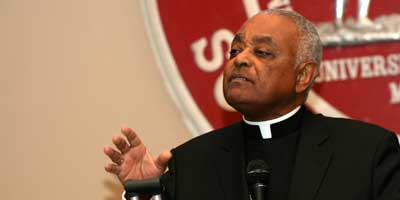
 COLUMBIA—How can a society solve its deepest problems if people can’t even discuss them in a civil manner?
COLUMBIA—How can a society solve its deepest problems if people can’t even discuss them in a civil manner?
Archbishop Wilton D. Gregory of Atlanta posed that difficult question to the audience at the 13th annual Joseph Cardinal Bernardin Lecture held Nov. 5 at the University of South Carolina. His topic, “Joseph Louis Bernardin: A Model for Civility in Public Discourse,” was especially relevant considering it was the eve of Election Day after a most contentious and negative election cycles.
Archbishop Gregory worked with Cardinal Bernardin in Chicago and received his episcopal ordination from him in 1983. He said the late cardinal always worked hard to practice civility, even when dealing with the most difficult church matters or societal issues ranging from nuclear war to poverty, the death penalty and abortion.
He said Cardinal Bernardin was always willing to listen to others and, more importantly, to treat people who disagreed with him with respect and Christian love. The archbishop said people today too often rush to demonize and denigrate anyone who disagrees with their particular point of view. The 24-hour news access, social media and the Internet also make it all too easy for people to only listen to views they agree with, and to instantly post negative comments or arguments without thinking them through, he said.
A lack of respect for those on the other side, in turn, breaks down not only the discussion but the fabric of society as a whole, he said.
“True consensus is about the moral issues that should be at the center of all laws,” he said. “We are a very diverse, pluralistic society, and the public consensus we need is not agreement on every law, but about the basic values we hold as people. And civility is the quality needed if we are to find common ground. Without a habit of civility, the depth of the problems we have can overcome any efforts to solve them … democracy and freedom guarantee disagreement. How we disagree is what civility is all about.”
Archbishop Gregory said civility is not something that comes naturally to every person, but it can be learned and cultivated, especially if people focus on the church’s teaching of the innate dignity of every person.
“Civility, like charity, is a virtue,” he said. “It does not come to us automatically. We have to work at it.”
He said Cardinal Bernardin believed people of faith and religious communities in general could play an important role in public discourse in the U.S. The challenge, Archbishop Gregory said, is for the faithful to act as an example for others and not allow disagreements over doctrine to erode the discussion.
“Religious communities should stand as models of civility when they enter the public arena,” he said. “Religion can deepen our sense of responsibility to the vulnerable, and the ways different religious communities engage each other can be a model for society in general.”
